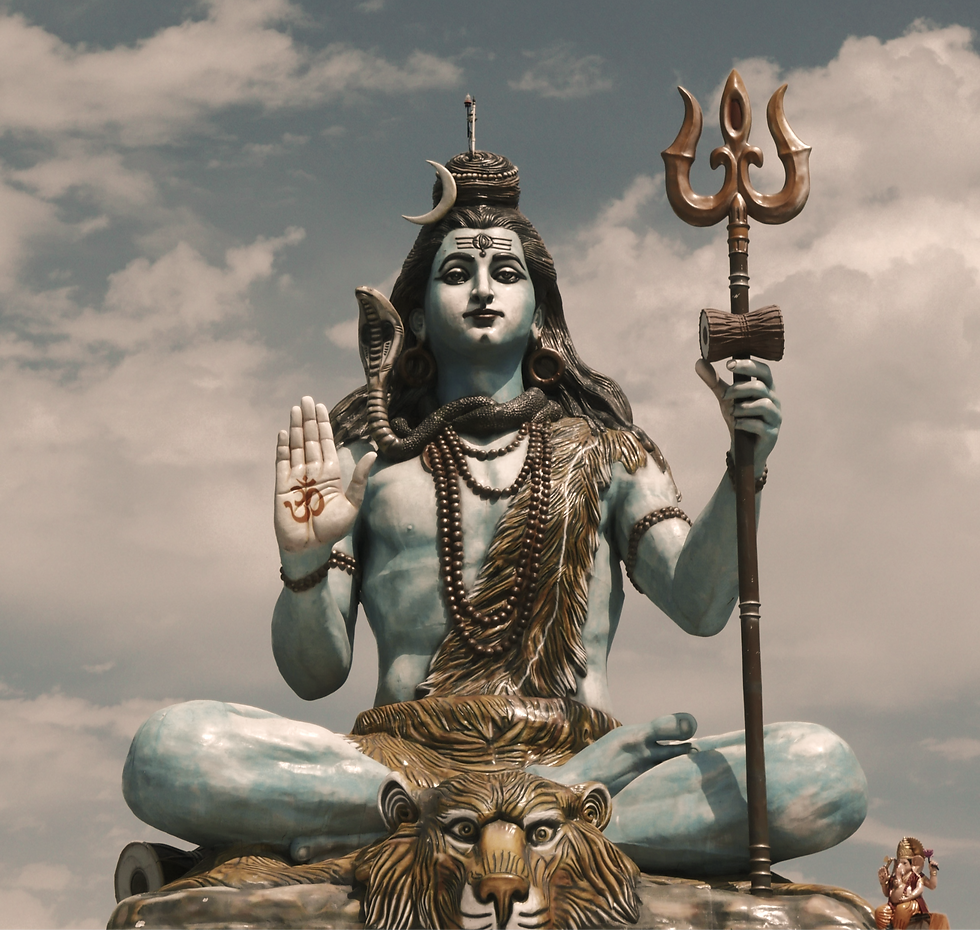SVĀDHYĀYA: THE ART OF STUDYING YOURSELF
- ojayogacommunity
- Jul 16, 2025
- 4 min read

Svādhyāya — Self-Study
The Fourth Niyama in the Yoga Sutras of Patanjali
Svādhyāya (Devanagari: स्वाध्याय) is a Sanskrit term meaning "self-study" or "one’s own reading." It holds rich and layered meaning across yogic and Vedic traditions. In the context of yoga, it is one of the five niyamas (inner observances or personal disciplines) outlined by Patanjali in the Yoga Sutras, and is considered essential for inner transformation and spiritual maturity.
But Svādhyāya goes beyond personal reflection—it also includes the study of sacred texts, mantra, and the soul itself.
Etymology + Meaning
The term Svādhyāya is a compound of two Sanskrit words:
Sva (स्व) = one’s own, self
Adhyāya (अध्याय) = chapter, lesson, reading
It may also be understood as:
Svā + Dhyāya = one’s own + meditating on
From this we get two dimensions of meaning:→ “One’s own reading or recitation”→ “Contemplation or meditation upon the self”
The root Dhyai (ध्यै) implies deep reflection or absorption. Svādhyāya, then, is both the study of sacred knowledge and the ongoing observation of one's own mind, motivations, behaviours, and patterns.
Scriptural Foundations
In ancient traditions, Svādhyāya first referred to the oral recitation of the Vedas—a practice intended to preserve sacred knowledge through memorisation and daily repetition. Over time, it expanded to include:
Study of sacred texts (śruti and smṛti)
Mantra japa (repetition of sound syllables pregnant with meaning)
Meditation and self-inquiry
Self-examination of thoughts, speech, and conduct
The Taittiriya Upanishad (1.9.1) declares Svādhyāya as foundational for a righteous and fulfilled life, right alongside values like Satya (truth), Damaḥ (self-restraint), Tapas (discipline), and Samaḥ (inner peace). The text even states:
स्वाध्यायान्मा प्रमदः — “Never neglect self-study.”
And, significantly, it also pairs Svādhyāya with Pravacana (teaching or sharing), implying that true learning ripens into compassionate transmission:
“Svādhyāya-pravacane ca” — “Study and teach.”

🧘♀️ Svādhyāya in the Yoga Sutras
In Yoga Sutra II.44, Patanjali writes:
स्वाध्यायादिष्टदेवतासंप्रयोगः॥
“From self-study arises communion with one’s chosen deity.”
This verse suggests that Svādhyāya is not only introspective—it’s sacred. Through committed reflection and the disciplined study of self and scripture, we develop a deeper connection with the divine, whether that’s understood as Īśvara, Atman, or simply the higher self.
Modern Application + Relevance
Svādhyāya in our current lives might look like:
Reading yogic texts like the Bhagavad Gita or Yoga Sutras, and applying their teachings to personal challenges
Chanting mantra to focus the mind and regulate the nervous system
Journaling patterns, projections, and core beliefs
Observing our own speech (as recommended in Bhagavad Gita 17.15)—ensuring our words are true, kind, necessary, and uplifting
Reflecting on the causes behind our habits or reactions, without judgement
It’s a form of inner tapas, or fire. A mirror held up to the psyche. And as Patanjali and the Dharma Shastras affirm, it is a practice of purification and liberation.
Svādhyāya in Recovery + Mental Health Work
For those on a path of recovery—whether from addiction, unhealthy habits, or limiting beliefs—Svādhyāya becomes a map and a torch.
It reveals:
How our past conditioning shapes present choices
Where shame or avoidance block growth
The deeper motives behind our craving or resistance
Where truth can be reclaimed and patterns rewritten
In this way, Svādhyāya helps us move beyond just "coping" into conscious healing. We become witnesses of our lives, rather than captives of them.

To Practice Svādhyāya…
Read one passage of a yogic or philosophical text. Pause. Ask: How does this apply to me today?
Write stream-of-consciousness thoughts each morning or after a strong emotional experience
Meditate on a question like: Who am I without this role or label?
Recite a meaningful mantra with intention and breath awareness
Observe your internal narratives throughout the day—without trying to change them at first, but rather just become truly aware of them.
Reflect before you speak: Is what I’m about to say true, kind, and elevating?
In Closing…
Svādhyāya is not just about study. It’s a sacred remembering. A return to the seat of your inner teacher. A discipline that says: You are worthy of your own attention.
It teaches us that our lives, just like the Vedas, are worthy of deep listening.
And that the truest wisdom is not always in books—sometimes, it's buried right beneath your next honest breath.
WANT TO BEGIN?
Start with one honest question:
“What part of myself am I ready to meet today?”
And let the study begin.
Every Saturday Oja Yoga hosts themed yoga classes drawing from one of the ten Yamas and Niyamas (yogi life codes and ancient wisdom unlocked) each week. Svadhyaya is just one of them. If you are curious to learn more about this weekly offering please click the button below and scroll down to the Saturday Upward Spiral Class information section. These are much more than your average yoga class. You can come to one or come to all (as long as you book in before hand) and receive some eye and heart opening education while we do our asana and pranayama practice. It's all about bringing community together and building healthy habits as a collective as well as individually. Great and inspiring for people on any step of their recovery journey or simply wanting some value add to their lives.




Comments